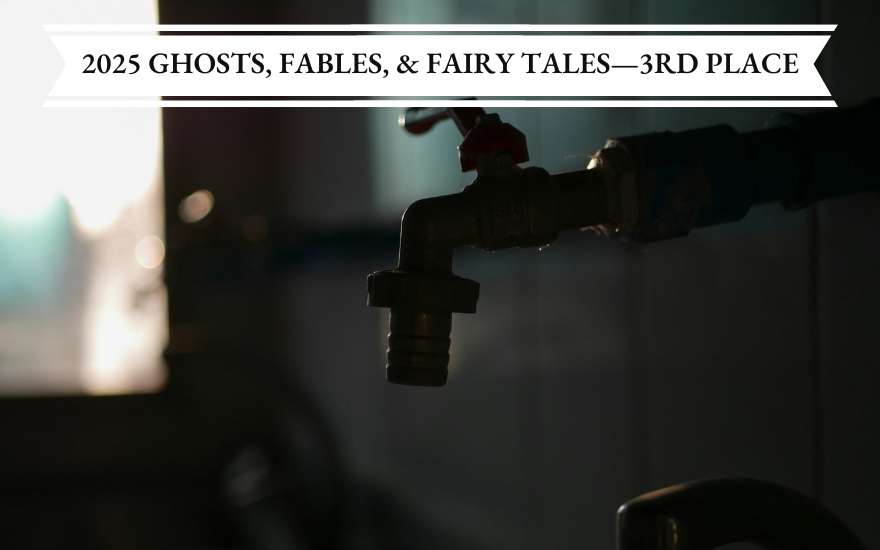Between Abuela’s mobile home and mine, a white sand path interweaves the moonlit scrub pine. Sometimes it is ribboned with the tracks of sidewinders, so we watch our step, especially near the Spanish bayonets beneath which they like to coil. If the snakes have any sense at all, they will stay put tonight. The fantasma rides moonlight like an updraft, talons gleaming, velvety wings combing the air.
The bathtub faucet drips, and my mind travels the sound of it to the dark drain from which crawfish sometimes emerge. Mami’s working the overnight shift at the airport and will come home smelling of hot dogs. Papi’s driving a cab. Except for the dripping, the place is silent. Me, I’m a fifteen-year-old high school dropout with a mind adept at focusing down and down until the only reality is this window where I wait for Ines, my tia, two years older than me and adjudicator of all that is awesome. Where I am naive, the product of strict and overprotective parenting, she is a teen sage, wise to all that’s bad, fine, rad, or elicits her incredulous, Oh right. Here’s how it is: Ines and I can watch the same sad story on TV, and I’ll exclaim, qué lastima! totally meaning it, while she looks on blandly and finally comes out with, Oh, right, and a smirk to remind me I’m a rube.
Any minute now, she will materialize, and I should say a prayer for her safety. Ines fears the night, fears la fantasma more—winged Llorona in love with moonlight. For years, darkness treated my tia cruelly, veiling the sins of a vile father, the man Abuela took up with after she and Abuelo divorced. Now in her bedroom late at night, Ines turns mean, transforms into a girl monster, lowering her voice, curling her thin fingers into claws, lifting her elbows like wings, making her eyes wide and fiendish. At first, I maintain my composure, telling her to stop, sighing. Then terror squeezes my eyes shut and screams out of me. When Abuela demands to know what the hell is going on in there, Ines only laughs.
I have no prayer for Ines.
And here she comes, a dark shape propelled by spindly legs. She looks spooked already, pale face lifted to the sky, then peering down as she dances around ruts and roots, then facing the sky again. The owl has a record, has rushed Ines twice this week. Probably has a nest nearby, Abuela says. I’ve heard it hooting but never seen it. For me, la fantasma lives only in my imagination, where it is something ferocious and beautiful. My breath grows audible against the window, and I use my sleeve to wipe away a coin of vapor. Ines looks almost fragile, like a moon maiden, like a child with dark curls swinging.
People assume we’re sisters, usually that I’m the older one. Abuela likes challenging cashiers and waitresses to guess which of us is her daughter and which her granddaughter. They always guess wrong, and my grandmother laughs at how readily they fall into her little trap. So here comes mi tia who is not mi hermana, the bond between us strong because it’s a blood bond and because when the relationship is good, it’s like stepping out of a cold shadow into the sunlight, goosebumps delicious as love. We understand each other. When no one’s looking, we hold tea parties and pretend we’re English royalty. We drink Materva out of plastic wine glasses and imagine the bubbles have made us drunk. We cut each other’s hair, bleach our Cuban girl mustaches together.
Ines moves quickly, and I start to think she’s in the clear, but a black form wheels out of the silver night and falls upon her, its immense wings indistinguishable from the shadow they cast. Mi tia makes a small sound, almost a whimper, but I hear it because my forehead presses the thin glass. I, too, gasp and feel my shoulders rise as Ines ducks and throws her forearms over her head. In the kind of silence that makes you feel you’ve gone deaf, the owl flaps and lurches so that whichever way Ines thinks to dart, it is already there, charging her.
Ines is no fiend. I see this now and at last send up a gauzy prayer, but it’s too late. The sand, the roots that breach it like the backs of sea monsters, make Ines’s skinny ankles wobble and turn. When she falls, I feel my body lurch—an S snapped into a straight line. I should grab the broom, run to her, save her from la fantasma. I should. But first I watch. First, I count to three.
Uno.
Dos.
Tres.
Ines! I call. I’m coming! Already sand has flooded my flip flops, grinds against my heels and the balls of my feet, slaps my calves as I run. Before me, the owl rises, slips into the moonlight where it glows pale and soft as fog, its yellow eyes watching me, blinking once before it floats away.
One of Ines’s canvas shoes lies on the path that is otherwise empty. I pick it up—too small for me—shake off the sand and walk to Abuela’s trailer. Ines? I call from the porch. Ines? The door is unlocked, and it’s dark inside. Feels like as far as I want to go is the doorway, so I stand there, a velvet painting of Ortiz’s guapo matador on the opposite wall, his sure gaze trained somewhere over my right shoulder. Ines? I call again. No one answers.
From the edge of the porch, I scan the path, the treetops, the sky, the moon so bright I can feel my pupils contract. Ines, I say to the stars, my voice tight, my hands beginning to sweat. Far away, la fantasma snickers, hoo-h’HOO-hoo-hoo.

